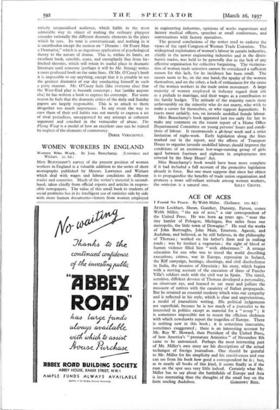ACE OF ACES
AFTER Lockhart, Shean, Gunther, Duranty, Farson, comes Webb Miller, " the ace of aces," a star correspondent of the United Press. He was born 44 years ago, " near the tiny hamlet of Polsagon, Michigan, five miles from our metropolis, the little town of Dowagiac." He read the works of John Burroughs, John Muir, Emerson, Agassiz, and Audubon, and believed, as he still believes, in the philosophy of Thoreau ; worked on his father's farm and in making roads ; was by instinct a vegetarian ; the sight of blood or human violence filled him " with abhorrence." A strange education for one who was to travel the world describing executions, crimes, war in Europe, repression in Ireland, the Riff campaign, beatings, shootings, and civil disobedience in India, the invasion of Abyssinia ; his story, which begins with a moving account of the execution of three of Pancho Villa's soldiers ends with the civil war in Spain. The timid, sensitive, diffident devotee of Thoreau developed a personality, an observant eye, and learned to eat meat and palliate the massacre of natives with the casuistry of Italian propaganda. But he retained an essential modesty which wins our sympathy and is reflected in his style, which is clear and unpretentious, a model of journalistic writing. His political judgements are superficial, because he is too much of a journalist to be interested in politics except as material for a " scoop " ; it is sometimes impossible not to resent the officious slickness with which newshawks report the tragedies of Europe. There is nothing new in this book ; it is sometimes inaccurate, sometimes exaggerated ; there is an interesting account by Mr. Roy W. Howard, then President of the United Press, of how America's " premature Armistice " of November 8th came to be announced. Perhaps the most interesting part of Mr. Miller's own story are his descriptions of the actual technique of foreign journalism. One should be grateful to Mr. Miller for his simplicity and his sensitiveness and one can see from his book how good a correspondent he is ; but, as in nearly all books of this kind, it seems finally as if the man on the spot sees very little indeed. Certainly what Mr. Miller has to .say about the battlefields of Europe and Asia is less interesting than the thoughts of the small boy on the










































 Previous page
Previous page